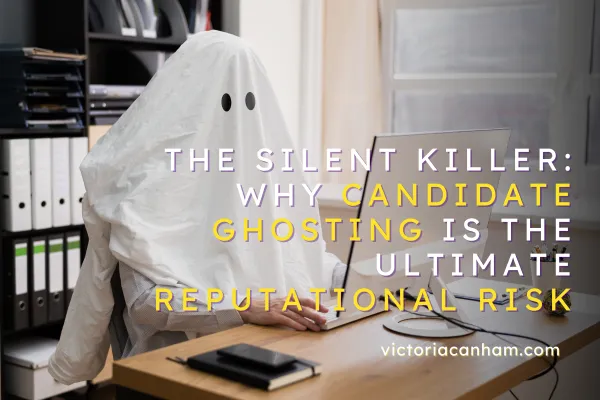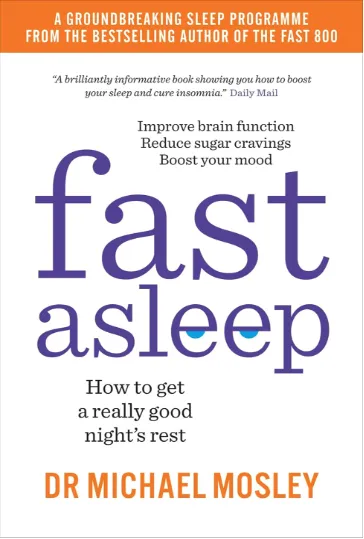The Silent Killer: Why Candidate Ghosting is the Ultimate Reputational Risk
Victoria Canham • 08 October 2025 • 5 min read

"The moment a candidate feels disposable, your employer brand—and potentially your customer loyalty—has been severely damaged. Recruitment is not HR's job alone; it is a critical marketing function where every act of disrespect is a public relations catastrophe."
Every business leader understands the chilling fear of a negative customer experience going viral. The social media storm, the devastating review, the loss of sales; companies invest fortunes in customer relationship management and meticulous service recovery to safeguard against it. They are hyper-vigilant about the customer journey.
Yet, a far more insidious and equally destructive threat is quietly undermining those very same businesses every day: candidate ghosting.
It is the silent killer of your brand.
For the longest time, the hiring process has been treated as a transactional, administrative function, safely isolated from the high-stakes world of business operations. This is a profound and costly error. The instant a candidate applies, they engage with your brand’s core messaging and values. When that engagement is met with silence, the message is clear, brutal, and public: people are disposable.
As an expert in employee experience, culture change, and the employee journey, I can tell you that this failure to communicate speaks volumes about a company's leadership and its commitment to respect.
A poor candidate experience doesn't just cost you a potential employee; it costs you future customers, brand advocates, and talent. That ghosted job seeker is often a current or future purchaser, a referral source, or a market influencer—and they are primed to become your most passionate anti-brand advocate.
The Lived Reality: When Disrespect Becomes Public
Let me give you a recent, real-world example of this destructive failure.
A friend of mine, a highly qualified professional, recently underwent four separate interview stages with a major, well-known corporation. Four interviews represents a significant investment of her time, effort, preparation, and emotional energy (as well as company time and resources). She reshuffled her schedule, took time off, and researched the company deeply, effectively working for them for free across those stages.
Now, after all that commitment, they have gone completely silent. They have started to ghost her.
The role has likely gone to someone else, but the company cannot even be bothered to send a two-line email confirming the decision or simply stating there's a delay. Both actions would take literal minutes to execute.
This is not a matter of 'being busy.' This is a failure of leadership and a signal of deep corporate disrespect. What is the lasting impact of those few minutes of silence?
1️⃣ A Passionate Detractor: A candidate might share this story with everyone she knows—friends, colleagues, and social media contacts. That one individual is now actively pushing people away from the company, both as job applicants and as customers.
2️⃣ Reputational Proof: This anecdote becomes proof that the company’s glossy marketing and messaging are a lie. Their internal culture treats people as completely disposable.
The Deeper Structural Flaw
Beyond the simple failure of communication, the very existence of a four-stage interview process signals a profound organisational flaw. Requiring so many hurdles is not a sign of rigour; it’s proof of weak leadership and a crippling "management by democracy" approach.
If the leadership team requires excessive internal consensus and multiple rounds just to hire one person, it demonstrates a lack of clarity regarding job requirements. And a collective inability to make a confident decision. This level of inefficiency doesn't just waste candidates' time and drain the budget; it actively cripples team performance by delaying crucial hires.
The Double Whammy: Losing Talent, Losing Customers
If a candidate is treated poorly, they don't always just move on; they sometimes (often) actively move against your brand. This creates a destructive double whammy that costs your business in two distinct areas: talent acquisition and revenue.
1. The Financial Leakage
This is not a 'soft' HR issue; it is a serious financial leakage. Ghosting directly impacts your bottom line:
❇️ Higher Cost-Per-Hire (CPH): A tarnished employer brand forces your talent team to work harder. You have to spend more on job advertising, higher recruiter fees, and premium salaries just to persuade talent to risk applying to a company with a poor reputation. The CPH can skyrocket by as much as 20% to 30% when the company culture is perceived as toxic or disrespectful.
❇️ Longer Time-to-Fill (TTF): Good candidates avoid brands with ghosting complaints. This leads to extended vacancies, which, in turn, burdens existing staff, reduces overall team performance, and delays critical projects. Every extra day a key role is open is a measurable cost to the business.
❇️ Loss of Qualified Referrals: Employees are hesitant to subject their talented friends and colleagues to a disrespectful hiring experience. This loss of your most cost-effective and highest-quality source of talent is a direct reflection of a weak culture.
The boundary between job seeker and customer is non-existent. Ghosted candidates become anti-brand advocates, sharing their negative story across social channels, Glassdoor, and professional networks.
❇️ Direct Customer Attrition: If they were already a customer, they are likely to leave. If they weren't, they never will be.
❇️ Network Deterrent: A single complaint on social media about being ghosted can be seen by thousands. This erodes trust, a fatal flaw in your brand’s overall marketing and messaging. People assume: if they treat their future employees this way, how are they treating their current customers?
❇️ Vendor and Partner Wariness: Even B2B partners observe employer reputation. A company with a track record of disrespect signals instability and poor leadership, leading to questions about its reliability.
2. The Customer Crossover
This is not a 'soft' HR issue; it is a serious financial leakage. Ghosting directly impacts your bottom line:
❇️ Higher Cost-Per-Hire (CPH): A tarnished employer brand forces your talent team to work harder. You have to spend more on job advertising, higher recruiter fees, and premium salaries just to persuade talent to risk applying to a company with a poor reputation. The CPH can skyrocket by as much as 20% to 30% when the company culture is perceived as toxic or disrespectful.
❇️ Longer Time-to-Fill (TTF): Good candidates avoid brands with ghosting complaints. This leads to extended vacancies, which, in turn, burdens existing staff, reduces overall team performance, and delays critical projects. Every extra day a key role is open is a measurable cost to the business.
❇️ Loss of Qualified Referrals: Employees are hesitant to subject their talented friends and colleagues to a disrespectful hiring experience. This loss of your most cost-effective and highest-quality source of talent is a direct reflection of a weak culture.
2. The Customer Crossover
The boundary between job seeker and customer is non-existent. Ghosted candidates become anti-brand advocates, sharing their negative story across social channels, Glassdoor, and professional networks.
❇️ Direct Customer Attrition: If they were already a customer, they are likely to leave. If they weren't, they never will be.
❇️ Network Deterrent: A single complaint on social media about being ghosted can be seen by thousands. This erodes trust, a fatal flaw in your brand’s overall marketing and messaging. People assume: if they treat their future employees this way, how are they treating their current customers?
❇️ Vendor and Partner Wariness: Even B2B partners observe employer reputation. A company with a track record of disrespect signals instability and poor leadership, leading to questions about its reliability.
Quick Wins for Senior Leaders: Stopping the Bleed Today
If you're reading this and realising your company might be guilty, you need immediate, decisive action that signals a culture change shift. These are not optional policies; they are mandatory signals of respect:
The Problem (The Ghosting Symptom): Silence after Application
The Solution (The Leadership Fix): Implement automated, personalised acknowledgement within 24 hours.
The Impact: Stops the initial reputational damage and shows basic respect for the candidate's time.
The Problem (The Ghosting Symptom): No Feedback for Rejections
The Solution (The Leadership Fix): Ensure every candidate interviewed receives a brief, professional rejection call/email, even if templated.
The Impact: Turns a negative experience into a neutral one, protecting future customer and referral potential.
The Problem (The Ghosting Symptom): No Internal Accountability
The Solution (The Leadership Fix): Make recruiter/ hiring manager responsiveness a key performance metric for your leadership team.
The Impact: Drives true culture change by making respectful behaviour a measurable aspect of job success.
So how do you turn this around on a bigger scale?
The Solution: A Red Carpet Candidate Experience
Patching over the symptoms isn't enough. To eliminate the reputational risk permanently, you must embed respect and transparency into the entire employee journey. This requires a fundamental culture change driven by leadership.
This is the concept behind the Red Carpet Candidate Experience:
❇️ Intentional Design: Every touchpoint, from the initial job advert to the final 'sorry you didn't get the job' communication, is meticulously designed to make the person feel valued, regardless of the outcome.
❇️ Trust as a Strategy: You move from simply processing applications to building a valuable talent pipeline, treating every candidate as a potential customer, advocate, or future employee.
You cannot afford to let internal administrative breakdowns sabotage your external reputation and financial health. Victoria Canham Consultancy is the go-to expert for fixing foundational business issues through people-first strategies.
If you recognise that your talent team needs to move beyond simple hiring to become an engine for brand advocacy, culture excellence, and sustained performance, you need a partner who understands the connection between leadership, culture, and the bottom line.
Talk to Victoria Canham Consultancy today to transform your candidate journey and safeguard your business reputation.
Book Recommendation
For a deeper dive into building a successful Employee Journey, I highly recommend The Employee Experience Advantage: How to Win the War for Talent by Giving Employees the Workspaces they Want, the Tools they Need, and a Culture they Can Celebrate by Jacob Morgan.
♦️ Hi. I'm Vicki, and I help businesses build high-performing, loyal teams by mastering the employee journey. I partner with leaders to drive tangible change, transforming company culture from a pretty promise on a slide deck into a daily reality. My approach goes beyond outdated HR strategies and gets to the heart of what truly motivates and retains your people.
Here's how I can support you:
Consulting & Coaching
I work directly with business leaders to diagnose and transform their employee experience, from culture to performance management. If you're ready to stop the cycle of burnout and build a team that thrives, not just survives, let's talk.
Click here to book a free 30-minute strategy call. No fluff, no sales pitches, just a direct conversation about your biggest challenges.
Talks & Keynotes
I deliver engaging keynotes that go beyond theory to provide actionable insights on leadership, culture, and performance. My talks are perfect for leadership teams and conferences looking to inspire real change.
Workshops & Training
My bespoke workshops and training sessions are designed to equip your leaders with the practical tools they need to build, manage, and retain exceptional teams. These are highly interactive sessions focused on creating measurable improvements in your business.
👉 Book a Clarity & Culture Call
Follow me on LinkedIn for more insights on building high-performing teams in 2025.
Comment On This Article
Recommended Reading
Fast Asleep: How to get a really good night's rest by Dr Michael Mosley
A good night's sleep is essential for a healthy brain and body. So why do so many of us struggle to sleep well? In Fast Asleep, Dr Michael Mosley explains what happens when we sleep, what triggers common sleep problems and why standard advice rarely works.
Prone to insomnia, he has taken part in numerous sleep experiments and tested every remedy going. The result is a radical, four-week programme, based on the latest science, designed to help you re-establish a healthy sleep pattern in record time.
With plenty of surprising recommendations - including tips for teenagers, people working night shifts and those prone to jet lag - plus recipes which will boost your deep sleep by improving your gut microbiome, Fast Asleep provides the tools you need to sleep better, reduce stress and feel happier.
We’re not just about overcoming obstacles, we’re about transforming lives.
Book Recommendation

Victoria Canham - Performance and People Strategic Partner
Victoria Canham is an ICF-accredited Certified Professional Coach and the founder of Victoria Canham Consultancy. We are a specialist performance consultancy partnering with senior leaders and HR teams to elevate culture, leadership, and employee experience. Rooted in behavioural insight and change expertise, we diagnose what's truly holding performance back, co-creating practical, strategic interventions that drive sustainable business results and build workplaces that work—for people and performance.
Hang out with us on social media

💸 Your people don’t leave for money. 💣 They leave for culture. 🔧 I fix that. 🏆 Retention & performance strategy that works.
Book a ☎️ | Fix the Leaks
© Copyright 2026 Victoria Canham Coaching | Website built by Me on FEA Create (aff.)
Performance Coaching Reading, London, Berkshire, Oxford | St George's Road, Reading, Berkshire, United Kingdom, RG30 2RL | +44 7377 527 529 | [email protected] Open Monday to Friday 9 am until 5 pm
